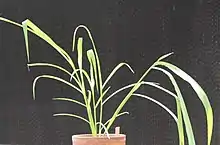Urochloa fusca
Urochloa fusca, the browntop signalgrass,[1] is a wild grass species with a native range extending from Paraguay in South America to the southern United States (Alabama, Arizona, Florida, Georgia, New Mexico, Texas, and Oklahoma),[2][3] and it is now found as a weed in Australia.[2][4] The species is diploid, with a base chromosome number of 9,[5] and utilizes the PCK enzymatic subtype of C4 photosynthesis. Based on a molecular phylogeny of the genus Urochloa, the closest relatives of U. fusca are Urochloa arizonica and Urochloa mollis[6] The genome of U. fusca is currently being sequenced by the Joint Genome Institute.[7][8]
| Urochloa fusca | |
|---|---|
 | |
| Scientific classification | |
| Kingdom: | Plantae |
| Clade: | Tracheophytes |
| Clade: | Angiosperms |
| Clade: | Monocots |
| Clade: | Commelinids |
| Order: | Poales |
| Family: | Poaceae |
| Subfamily: | Panicoideae |
| Genus: | Urochloa |
| Species: | U. fusca |
| Binomial name | |
| Urochloa fusca B.F. Hansen & Wunderlin | |
| Synonyms | |
|
Brachiaria fasciculata | |
Ecology
Prefers moist and the disturbed areas at low elevations.[4]
References
- USDA, NRCS (n.d.). "Urochloa fusca". The PLANTS Database (plants.usda.gov). Greensboro, North Carolina: National Plant Data Team. Retrieved 27 July 2015.
- "Urochloa fusca | GrassWorld".
- "Lady Bird Johnson Wildflower Center - the University of Texas at Austin".
- "Herbarium".
- Osvaldo Morrone, Alejandro Escobar, and Fernando O. Zuloaga, Chromosome Studies in American Panicoideae (POACEAE) Annals of the Missouri Botanical Garden 2006 93 (4), 647-657
- Diego L. Salariato, Fernando O. Zuloaga, Liliana M. Giussani, Osvaldo Morrone, Molecular phylogeny of the subtribe Melinidinae (Poaceae: Panicoideae: Paniceae) and evolutionary trends in the homogenization of inflorescences, Molecular Phylogenetics and Evolution, Volume 56, Issue 1, July 2010, Pages 355-369, ISSN 1055-7903
- "Urochloa fusca LBJWC-52 (ID 234780) - BioProject - NCBI".
- "JGI GOLD | Project".